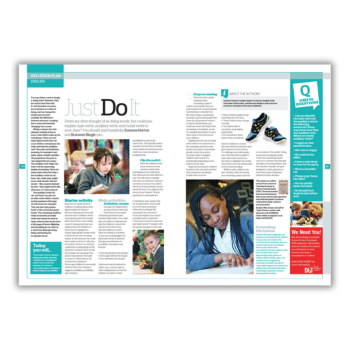We often think of verbs as ‘doing words’. But could you explain main verbs, auxiliary verbs and modal verbs to your class? Use this verbs KS2 lesson plan to do just that…
You may think a verb is simply a ‘doing word’. However, they are much more than that. A verb describes an action, an occurrence or a state of being, and can change the whole tone of a text. Consider the difference between someone ‘creeping’ into a room and someone ‘charging’ into a room.
Within a clause, the verb element consists of one or more verbs which make up the verb phrase. There are two main types of verb that can occur within a verb phrase: the main verb and the auxiliary verb.
The main verb indicates meaning, for example: read, swim, argue, wonder and like – ‘He jumped into the pool’ or ‘she enjoyed the ice cream’.
The auxiliary verb ‘helps’ the main verb by expressing shades of meaning. There are many main verbs, but only a few auxiliary verbs:
- be
- do
- have
- can
- could
- may
- might
- must
- shall
- should
- will
- would
Auxiliary verb examples
- ‘She must be finished by now’
- ‘They might arrive this afternoon’
- ‘I have eaten it’
Modal verbs
The auxiliary verbs ‘be’, ‘do’ and ‘have’ can also act as main verbs within a clause as they possess a full range of verb forms, for example: ‘The coat has/had a green hood’ or ‘the coats have green hoods’.
The remaining auxiliary verbs are known as modal verbs and cannot be used as main verbs as they do not have a full range of forms. Mighting and shoulding do not exist as a verb form although doing, being and having are acceptable forms.
Verbs KS2 lesson learning objectives
- Use modal verbs to enhance writing and clarify meaning
- Explain how changing the modal verb can alter the meaning of a sentence
- Use modal verbs or adverbs to indicate degrees of possibility
Suzanne Horton is subject leader for primary English. Branwen Bingle is a senior lecturer in primary education.

Similar resources
- Poetry prompts with Joseph Coelho – Author In Your Classroom ep 29
- Bring mythology into the modern world with Louie Stowell – Author In Your Classroom ep 28
- Plan an action story with Jason Rohan – Author In Your Classroom ep 27
- Collect ideas for characters with Lisa Thompson – Author In Your Classroom ep 26
- Write modern fairy tales with Konnie Huq – Author In Your Classroom ep 25













